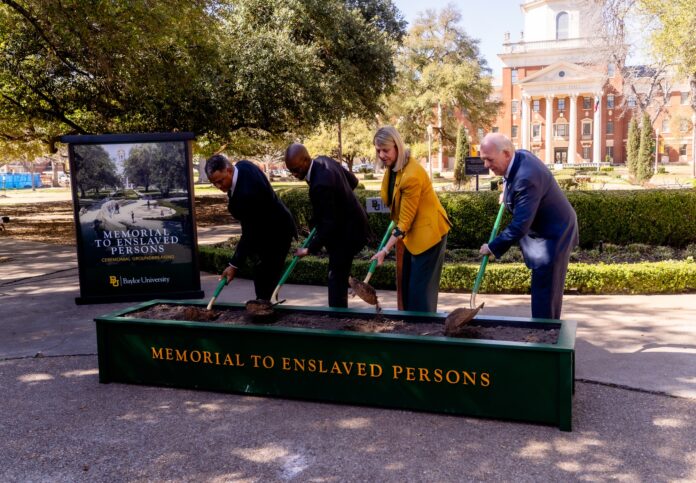
By Rory Dulock | Staff Writer
A ceremonial groundbreaking of the Memorial to Enslaved Persons was held Friday at Founders Mall, marking the start of phase two of the project, which is expected to be completed by next year.
To start off the ceremony, Board of Regents Chair William Mearse gave an overview and updates in regard to the project.
“In May 2022, the board approved a four-phased framework,” Mearse said. “Phase one is complete, with renowned architecture design firm Sasaki having been selected for the new campus experience project. Phase two is now underway, with the groundbreaking and the additional historical context to be placed around the existing Judge Baylor statue.”
Mearse said the memorial will help Baylor address a challenging part of its history in a Christian manner.
“We pray this memorial and other projects will individually and collectively serve as an acknowledgment of a challenging part of our history while also helping to see the need for a Christian repentance while we press toward renewal, reconciliation and restoration,” Mearse said.
President Linda Livingstone then addressed the importance of the project as a way to recognize the other unknown founders, or builders, who helped create Baylor.
“While we build this memorial, we will also add additional context around the existing Judge Baylor statue that will connect his story to this memorial,” Livingstone said. “Based on the research that we’ve done, we know enslaved persons formed half of the population of the area surrounding our original campus in Independence. Those individuals contributed to the construction of the buildings and the activities of daily life there for at least two decades. This aspect of Texas’ and Baylor’s history will be depicted with an enslaved population density map on the ground in front of the memorial once it is completed.”
Livingstone said it is because of Baylor’s core values and Christian roots that it needs to come forward about the darker parts of its history.
Dr. Alicia Monroe, regent and co-chair of the Commission on Historic Campus Representations, said the project honors the unknown individuals who made a difference to the university, and it demonstrates the commitment the university has to reckoning with its history.
“We don’t know the names of the individuals who contributed to the building of the first site of our university, but we know that there was effort invested,” Monroe said. “We can’t quantify the money, but what we can quantify is that their investment in the founding of this university has provided infrastructure and provided resources that allow us to be where we are here today, committed to the service of a university that is authentically committed to God’s word.”
Dr. Alan Lefever, director of the Texas Baptist Historical Collection, gave insight into the historical significance of the soon-to-be memorial.
“The fact of the matter is the people that we are honoring and acknowledging today — they were the makers of Baylor University, they were one of our founders,” Lefever said. “For 117 years, the founders and their descendants were denied access to this school. Today, Baylor is more diverse than we have ever been in our history. I think that’s amazing. We must never stop collecting our Baylor Family history. Learning about our past can only make us stronger in the future.”





